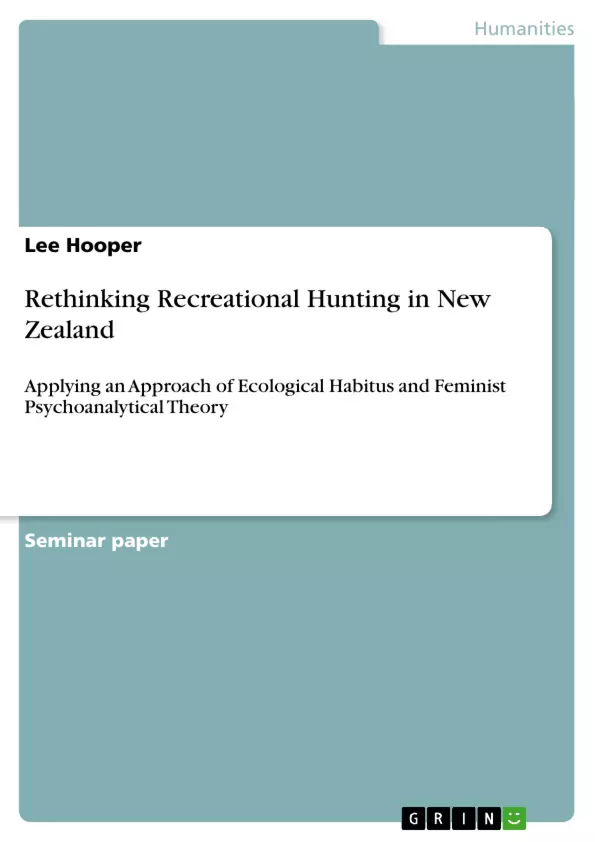The argument of whether recreational hunting is justified in the modern era is a controversial issue, with pros and cons being espoused by both sides of the argument. Through applying a sociological theory that looks to analyse the interaction and relationship between the environment and the people who inhabit it, it will be argued that the position one takes on hunting is a reflection of their ecological habitus on the macro-level and the desire to satisfy emotional needs on the individual level. By first outlining the historical context of hunting within in New Zealand, as well as defining the basic concepts of ecological habitus, it will be demonstrated that hunting attitudes are influenced by identification with a national ‘kiwi’ identity, one’s environmental location and type of capital possessed. Furthermore, it will be shown that those who choose to hunt can be categorised into three general groups, with all displaying similar underlying themes. In applying the theoretical ideas of ecological habitus and feminist psychoanalytical theory, a more complex understanding is gained on the various external and internal influences that direct people’s behaviours and belief systems around hunting. Relational processes between people and their environments, alongside repressed emotional states, are also shown to play an integral part in the decision to hunt.
Inhaltsverzeichnis (Table of Contents)
- Rethinking Recreational Hunting in New Zealand: Applying an Approach of Ecological Habitus and Feminist Psychoanalytical Theory
- The Historical Context of Hunting in New Zealand
- Ecological Habitus: A Framework for Understanding Hunting Attitudes
- Habitus, Field, and Capital: Theoretical Underpinnings
- Ecological Habitus in the Context of New Zealand
- Influence of 'Kiwi' Identity on Hunting Attitudes
- Field Placement and Hunting Attitudes in New Zealand
- Capital and Hunting Attitudes in New Zealand
- Strengths and Limitations of Ecological Habitus
Zielsetzung und Themenschwerpunkte (Objectives and Key Themes)
This essay aims to analyze the complex relationship between recreational hunting in New Zealand and the ecological, social, and individual factors that influence it. By applying the concept of ecological habitus, which focuses on the interplay between people and their environments, the essay seeks to shed light on how hunting attitudes are shaped by a range of influences.
- The Historical Evolution of Hunting in New Zealand
- The Concept of Ecological Habitus and its Application to Hunting Attitudes
- The Role of National Identity, Field Placement, and Capital in Shaping Hunting Attitudes
- The Relationship between Hunting and Repressed Emotional Needs
- The Strengths and Limitations of Ecological Habitus as a Framework for Understanding Hunting
Zusammenfassung der Kapitel (Chapter Summaries)
The essay begins by outlining the historical context of hunting in New Zealand, tracing its evolution from a subsistence activity to a recreational practice. This historical development has led to changes in public perception of certain species, with some animals transitioning from valuable game to pests.
The essay then introduces the concept of ecological habitus, highlighting its relevance to understanding hunting attitudes. This theoretical framework emphasizes the interconnectedness between people and their environments, exploring how individuals' social and ecological choices are shaped by their identities and experiences.
The author delves into the various factors that influence hunting attitudes, including national identity, field placement, and capital. The essay examines how the "kiwi" identity, with its focus on environmental protection, has influenced perceptions of hunting in New Zealand. It also explores the differences in hunting attitudes between rural and urban areas, as well as the impact of economic, cultural, and social capital on hunting practices.
Schlüsselwörter (Keywords)
The key concepts explored in this essay include recreational hunting, ecological habitus, national identity, field placement, capital, feminist psychoanalytical theory, repressed emotional needs, and the relationship between people and their environments. This essay examines the complex factors that influence attitudes towards hunting in New Zealand, with a particular focus on the theoretical framework of ecological habitus.
Frequently Asked Questions
Is recreational hunting justified in modern New Zealand?
The essay explores this controversial issue by looking at the interaction between people, the environment, and social identities.
What is "ecological habitus"?
Ecological habitus is a sociological framework that analyzes how a person's environmental location and identity shape their attitudes toward nature and hunting.
How does the "Kiwi" identity influence hunting?
Identification with a national New Zealand identity often involves a focus on environmental protection, which can lead to viewing certain introduced species as pests to be hunted.
Why do people choose to hunt according to this study?
The study suggests that hunting satisfies emotional needs and is influenced by field placement (rural vs. urban) and the type of capital (social/economic) an individual possesses.
How has the perception of game species changed over time?
Historically, many species were introduced for subsistence or sport, but over time, some have transitioned from being valuable game to being classified as environmental pests.
- Quote paper
- Lee Hooper (Author), 2011, Rethinking Recreational Hunting in New Zealand, Munich, GRIN Verlag, https://www.grin.com/document/233135



